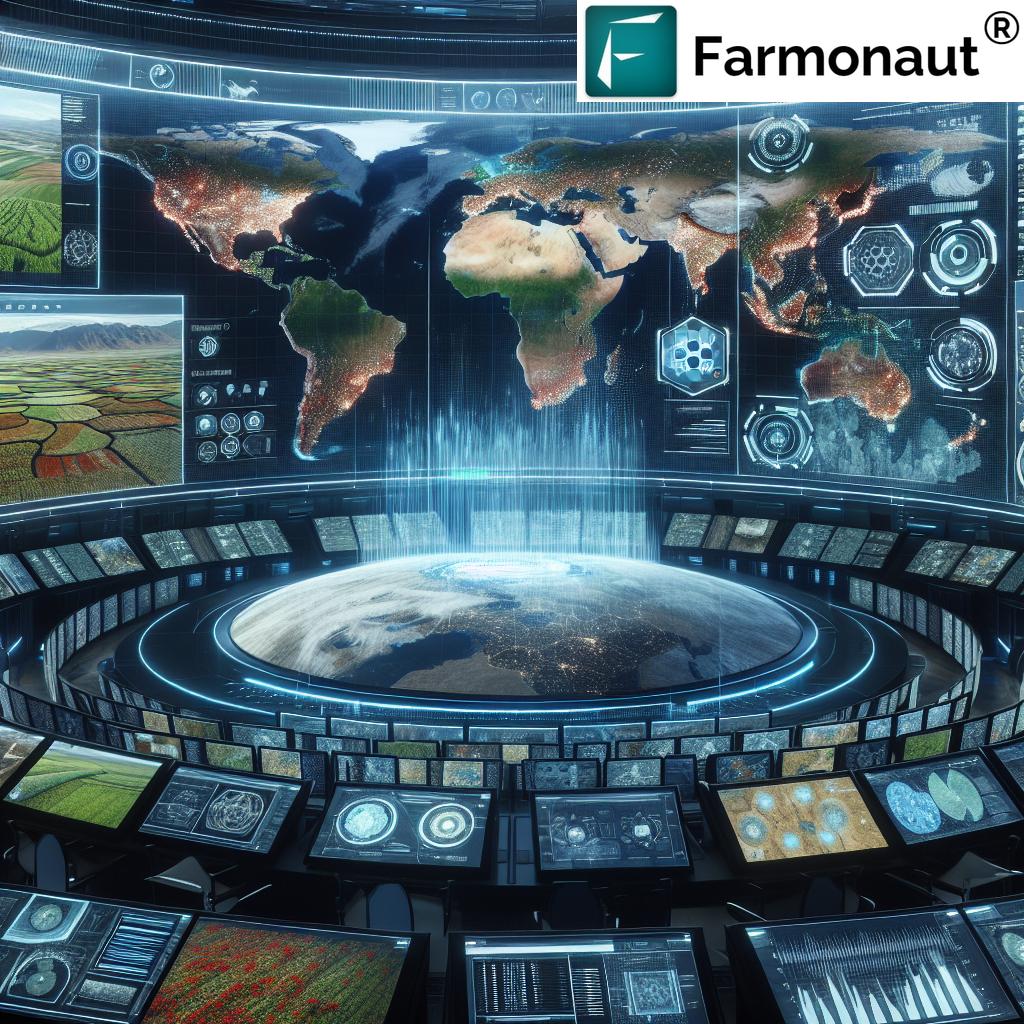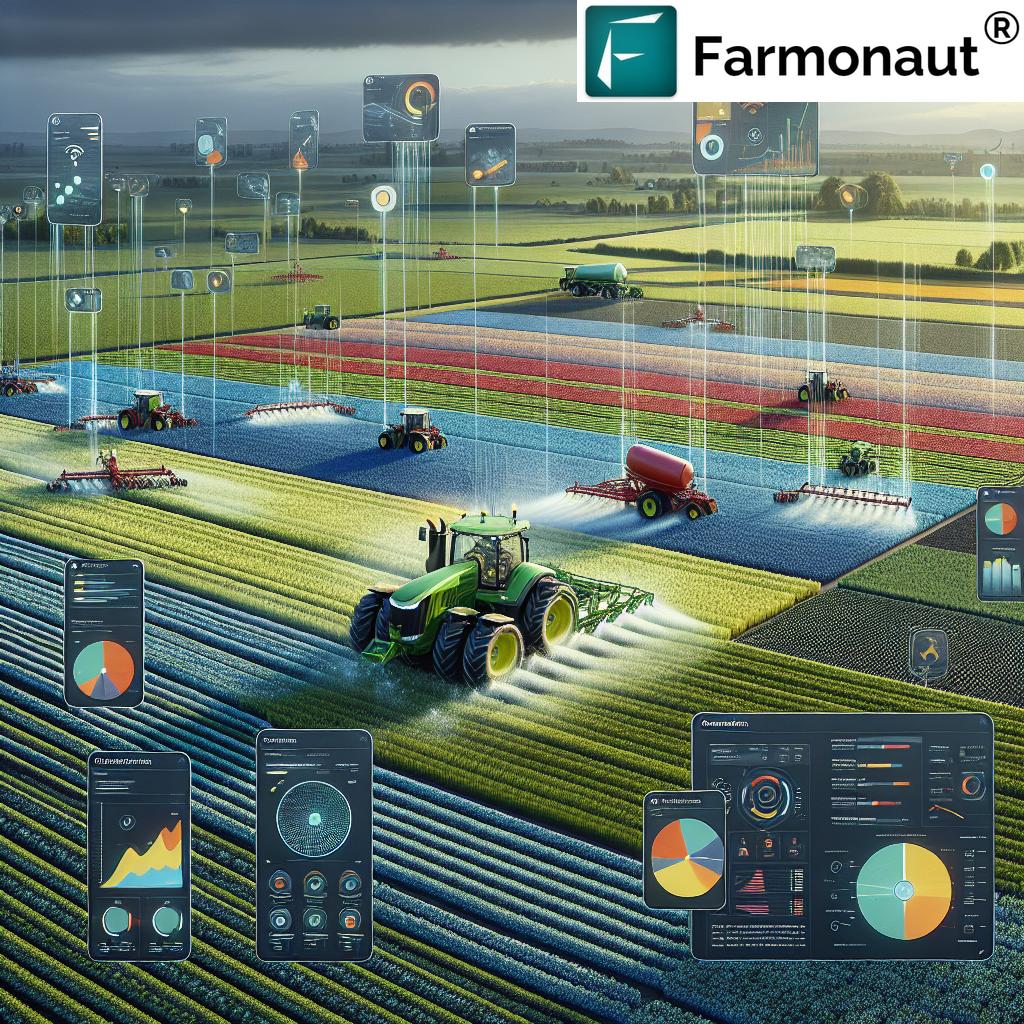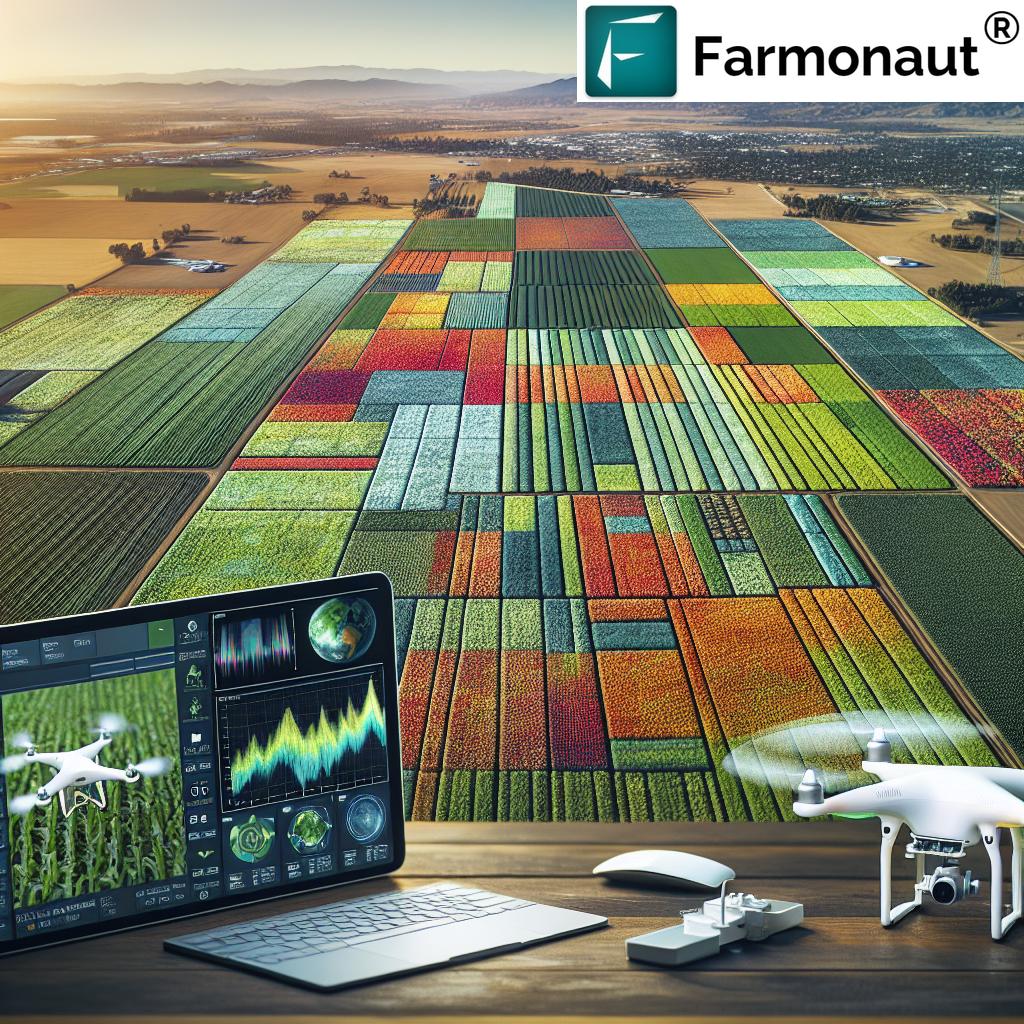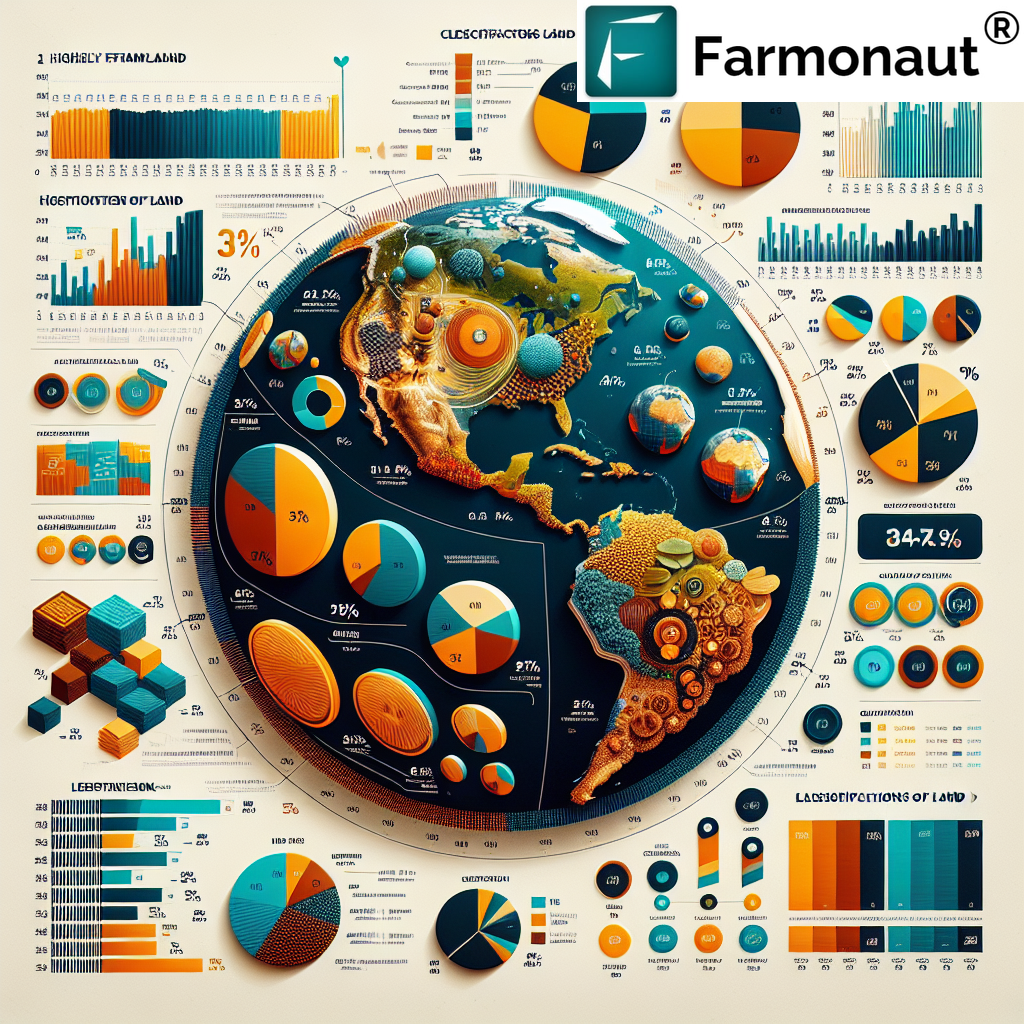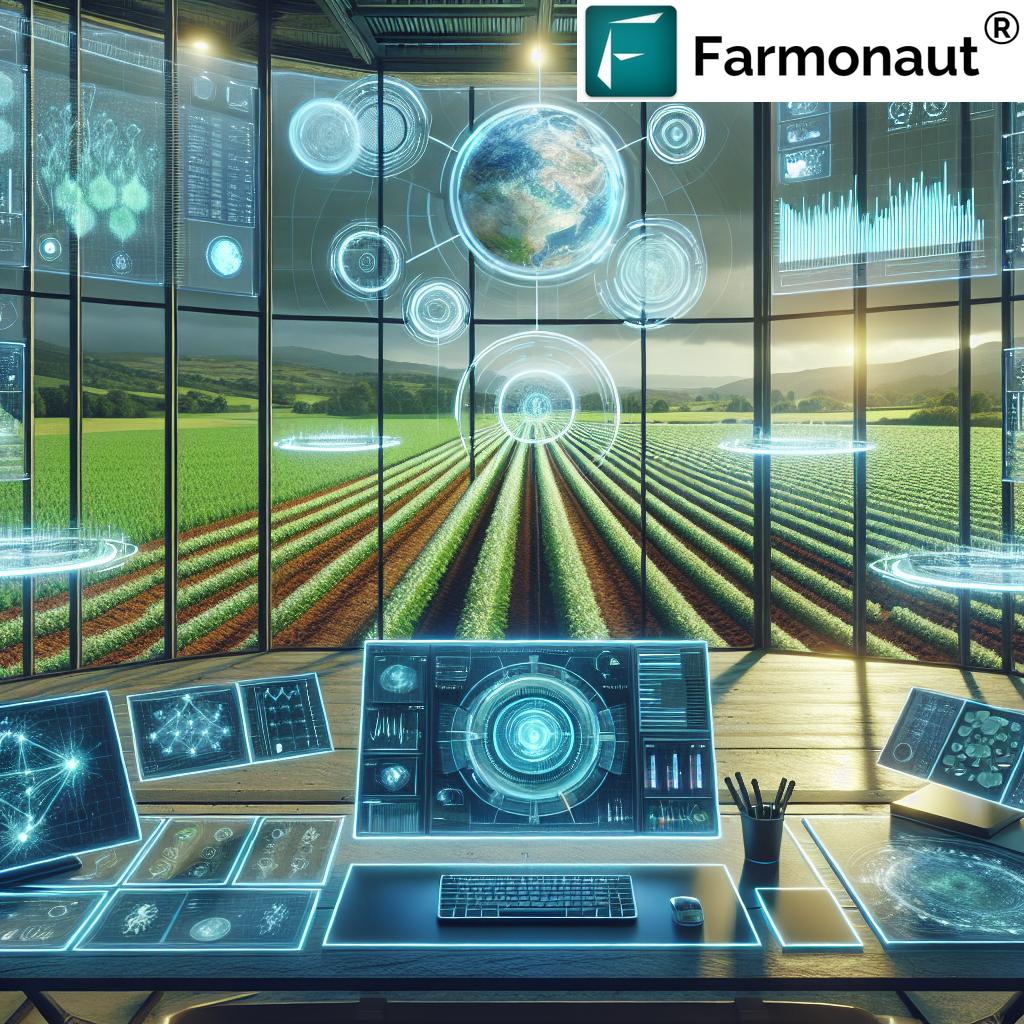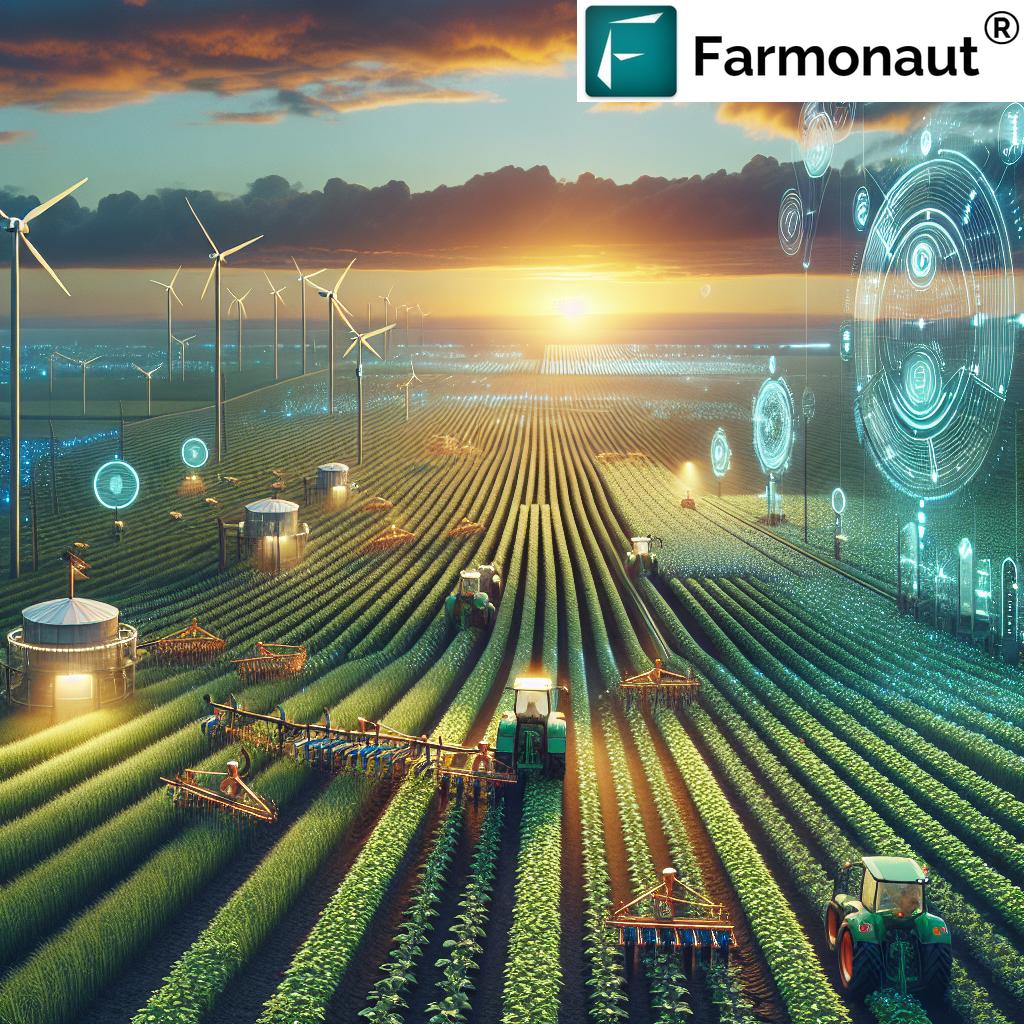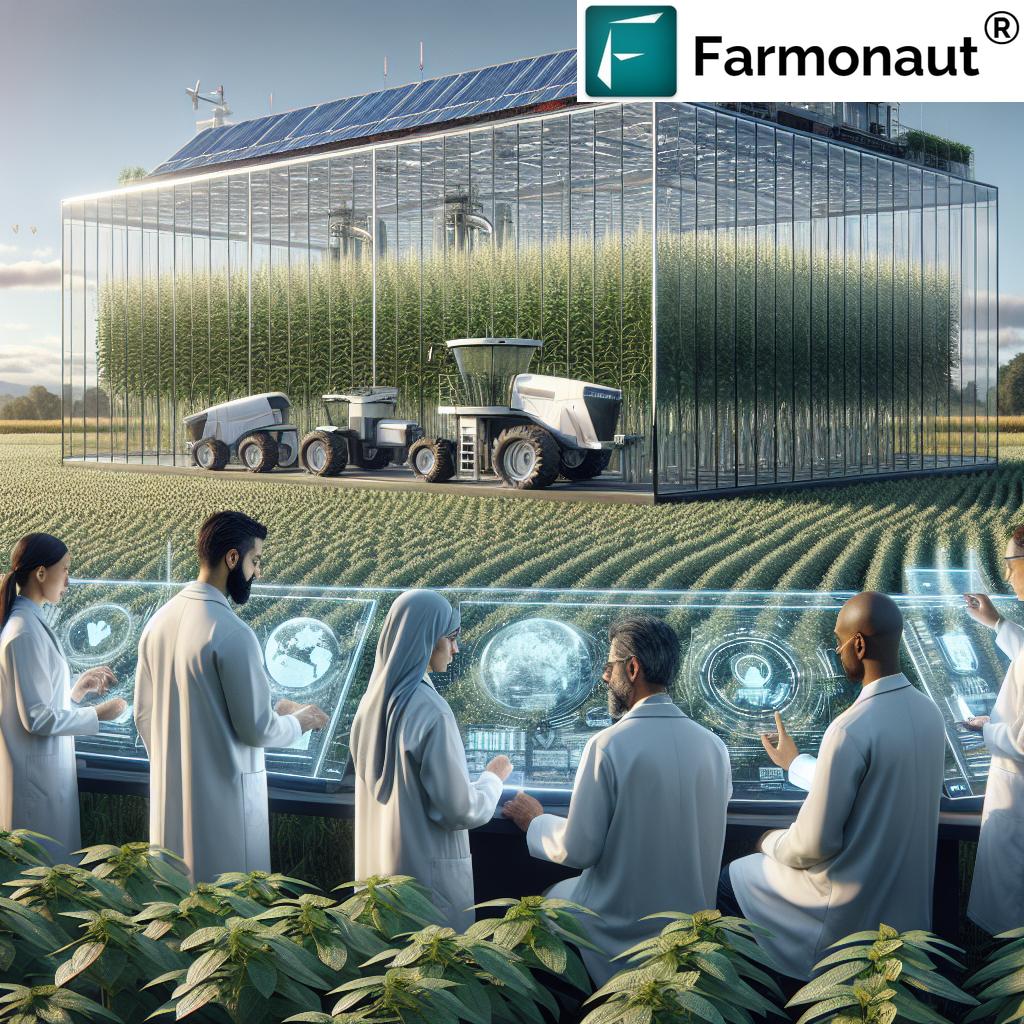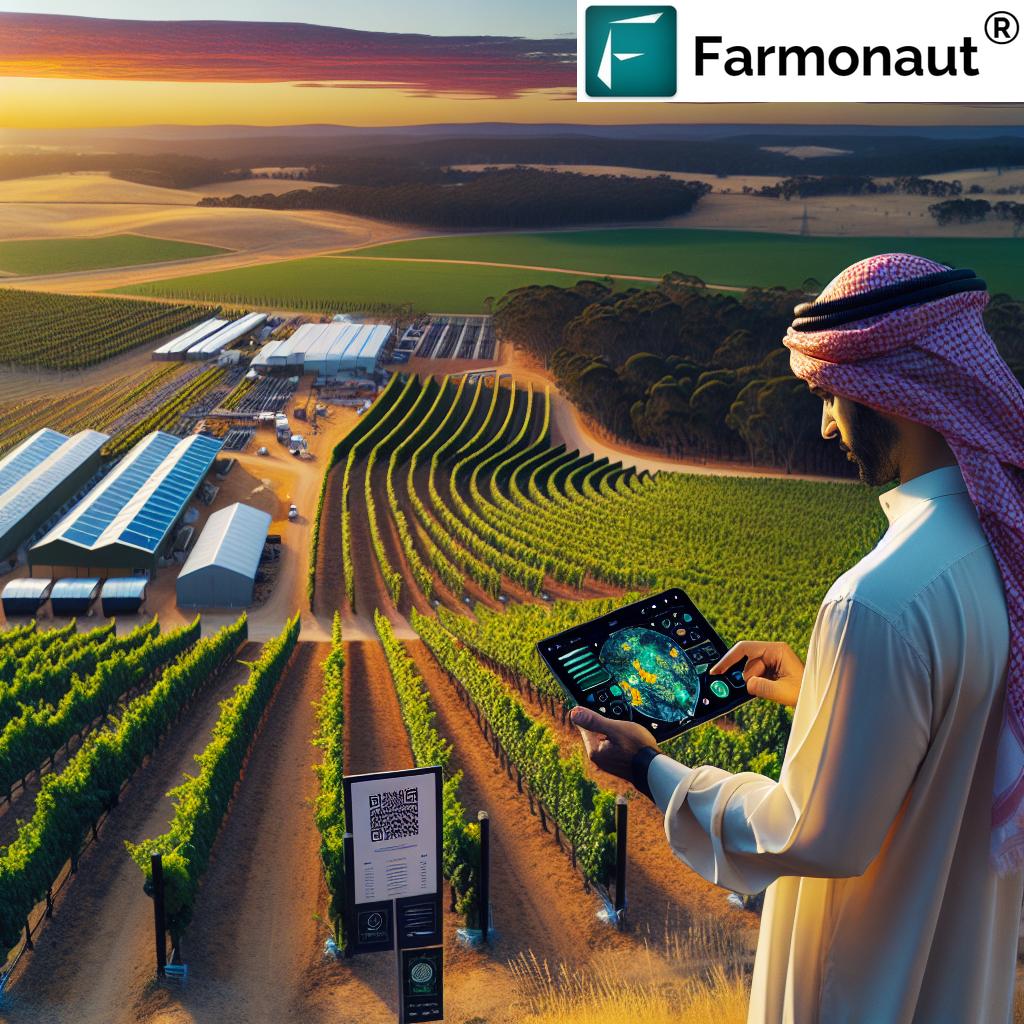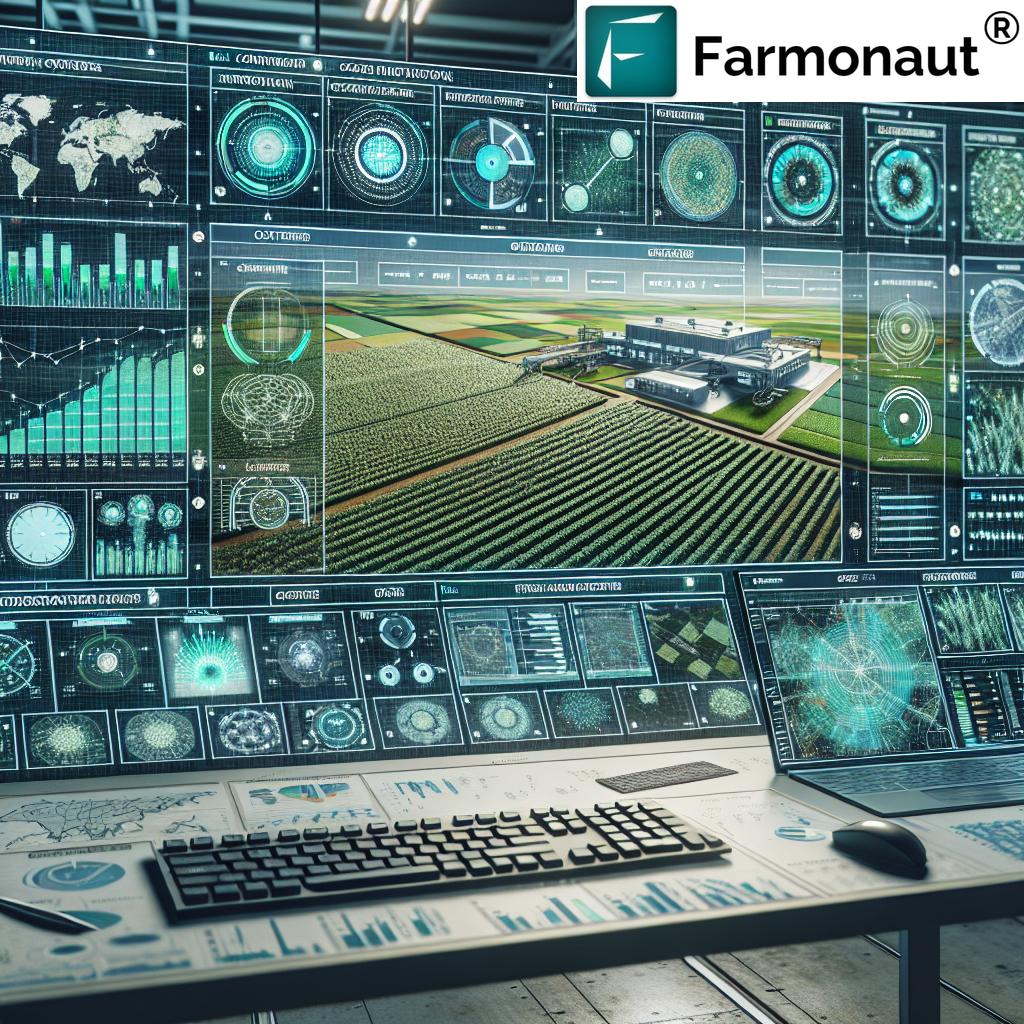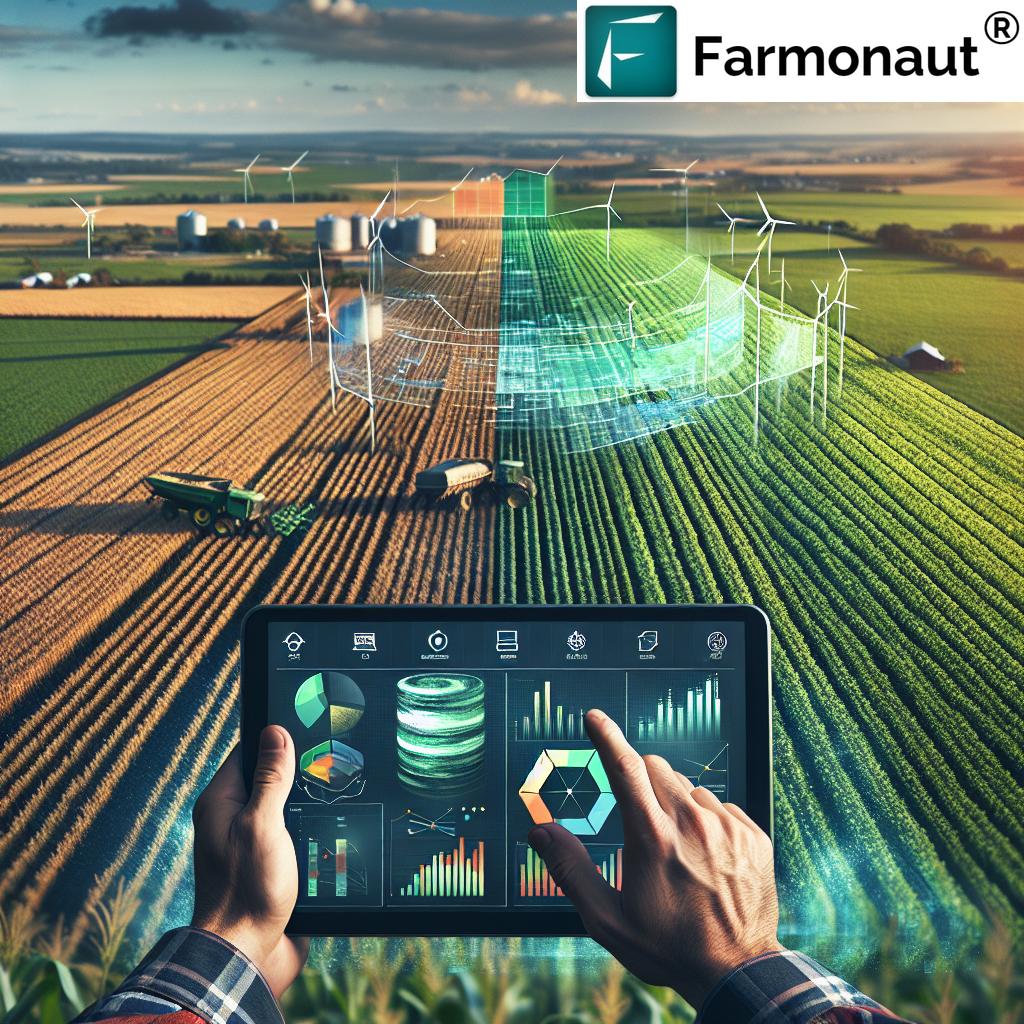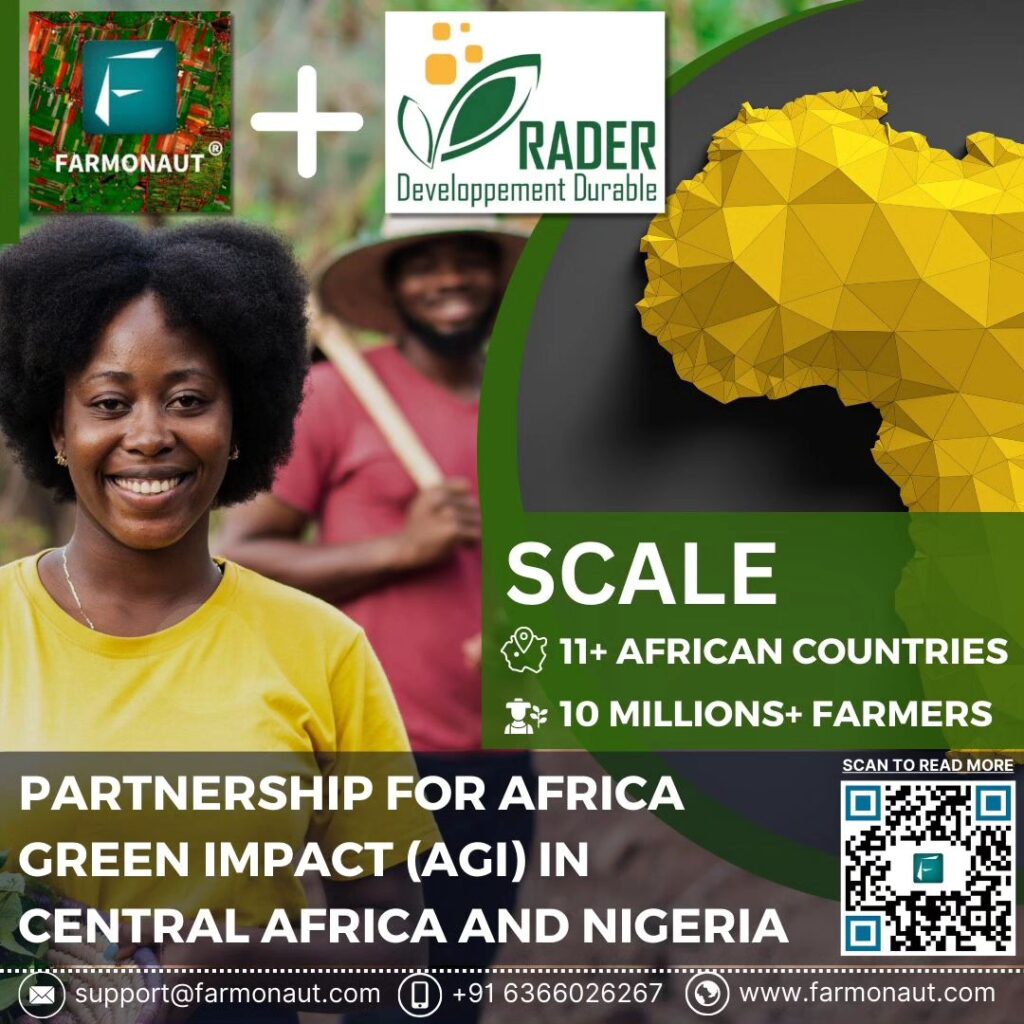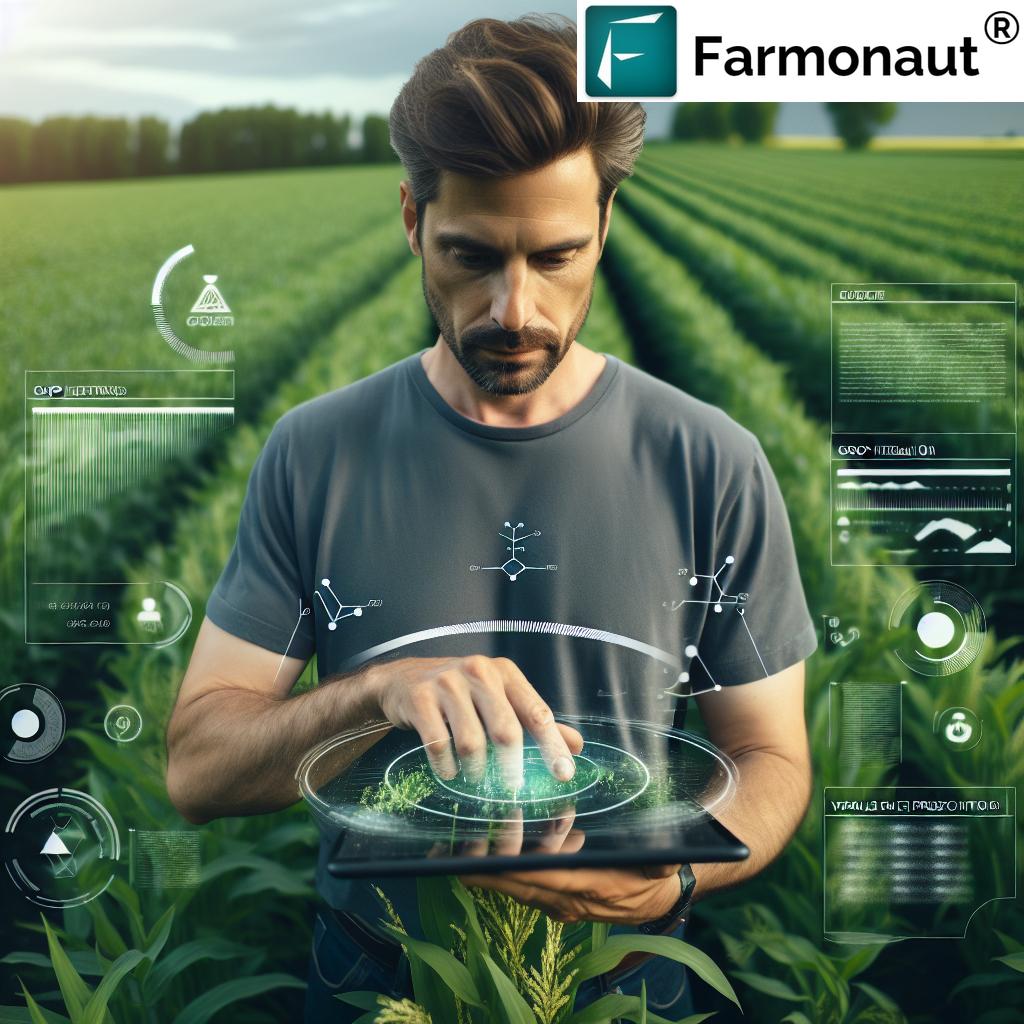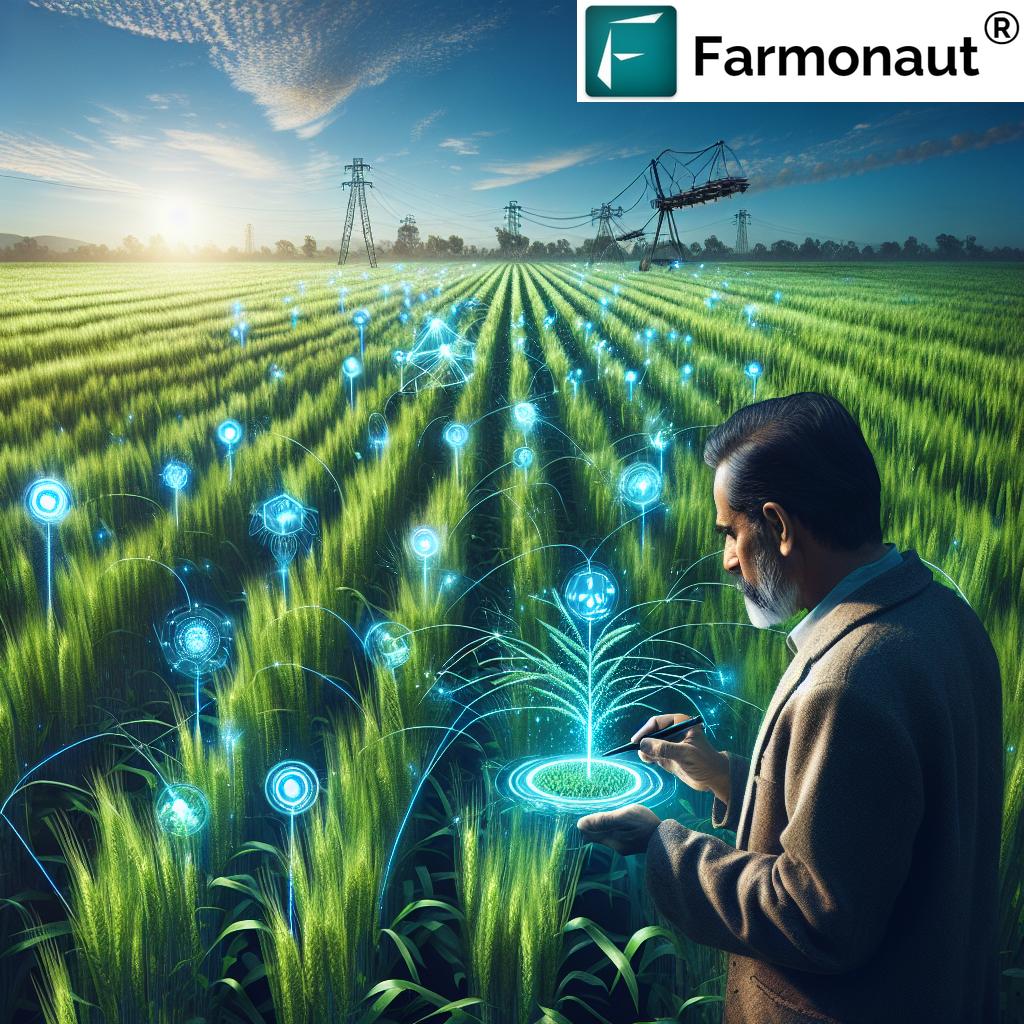Revolutionizing Agriculture: How Farmonaut’s Sustainable Farming Tech Combats Land Degradation and Boosts Food Security
“Agriculture contributes to 70% of freshwater use globally, highlighting the urgent need for water conservation in farming practices.”
In an era where the global population continues to grow and climate change poses unprecedented challenges, the need for sustainable farming practices has never been more critical. As we face the dual crises of land degradation and food insecurity, innovative solutions are emerging to revolutionize agriculture and pave the way for a more sustainable future. At the forefront of this agricultural revolution is Farmonaut, a pioneering agritech company that’s leveraging cutting-edge technology to combat environmental degradation and enhance food security worldwide.
In this comprehensive blog post, we’ll explore how Farmonaut’s sustainable farming technologies are addressing some of the most pressing issues in modern agriculture. From precision agriculture to soil health management, we’ll delve into the innovative approaches that are transforming the way we grow food and manage our precious land resources.
The Urgent Need for Sustainable Farming Practices
Before we dive into the solutions, let’s take a closer look at the challenges we’re facing. A recent UN report has sounded the alarm on the dire state of our planet’s land resources and the urgent need for action. Here are some sobering statistics that highlight the severity of the situation:
- Agriculture accounts for 23% of greenhouse gas emissions
- 80% of deforestation is driven by agricultural expansion
- 70% of freshwater usage is attributed to agriculture
- An area equivalent to the size of Russia is already affected by land degradation
- Approximately 100 million hectares of land are degraded annually
These figures paint a stark picture of the environmental impact of current agricultural practices. If left unchecked, these trends could lead to intensified soil degradation, increased food insecurity, and further exacerbation of climate change. The need for a paradigm shift in agriculture is clear, and this is where innovative technologies like those developed by Farmonaut come into play.
Farmonaut: Pioneering Sustainable Farming Solutions
Farmonaut is at the forefront of the agricultural technology revolution, offering advanced, satellite-based farm management solutions that are accessible via Android, iOS, web browsers, and API. The company’s mission is to make precision agriculture affordable and accessible to farmers worldwide, integrating innovative technology and data-driven insights into traditional farming practices.
Let’s explore some of the key technologies and solutions that Farmonaut offers to combat land degradation and boost food security:
1. Satellite-Based Crop Health Monitoring
One of Farmonaut’s cornerstone technologies is its satellite-based crop health monitoring system. By utilizing multispectral satellite imagery, Farmonaut provides farmers with real-time insights into their crops’ health, including:
- Vegetation health indices (NDVI)
- Soil moisture levels
- Early detection of pest and disease outbreaks
- Crop stress identification
This technology enables farmers to make data-driven decisions about irrigation, fertilizer application, and pest management, ultimately optimizing crop yields while minimizing resource wastage. By promoting more efficient use of water and chemicals, this system directly contributes to sustainable farming practices and helps combat land degradation.
2. Jeevn AI Advisory System
Farmonaut’s Jeevn AI is an artificial intelligence-driven farm advisory tool that delivers personalized insights and recommendations to farmers. By analyzing satellite data, weather forecasts, and other relevant inputs, Jeevn AI provides:
- Customized crop management strategies
- Precise irrigation scheduling
- Fertilizer optimization recommendations
- Early warning systems for potential crop threats
This AI-powered system empowers farmers to implement climate-smart farming techniques, reducing their environmental impact while improving crop resilience and productivity. By optimizing resource use and promoting sustainable practices, Jeevn AI plays a crucial role in combating land degradation and enhancing food security.
3. Blockchain-Based Product Traceability
Farmonaut’s blockchain technology enables end-to-end traceability in agricultural supply chains. This innovative solution offers:
- Transparent tracking of produce from farm to consumer
- Enhanced food safety and quality assurance
- Reduced fraud and improved trust in supply chains
- Support for sustainable and ethical farming practices
By promoting transparency and accountability in agriculture, this blockchain solution encourages sustainable farming practices and helps consumers make informed choices about the food they purchase.
4. Carbon Footprinting and Sustainability Tracking
In response to growing environmental concerns, Farmonaut offers carbon footprint tracking for agribusinesses. This feature allows farmers and agricultural companies to:
- Monitor their greenhouse gas emissions in real-time
- Identify areas for emission reduction
- Implement and track sustainable farming practices
- Comply with environmental regulations and certifications
By providing tangible data on environmental impact, Farmonaut empowers farmers to take concrete steps towards more sustainable operations, directly contributing to the fight against climate change and land degradation.
The Impact of Farmonaut’s Technologies on Sustainable Farming
The adoption of Farmonaut’s technologies has far-reaching implications for sustainable agriculture and food security. Let’s explore some of the key benefits:
1. Precision Agriculture for Resource Conservation
By providing farmers with detailed, real-time data on their crops and soil conditions, Farmonaut enables precision agriculture practices that significantly reduce resource wastage. This approach leads to:
- Reduced water usage through optimized irrigation
- Decreased chemical inputs by targeting application
- Minimized soil erosion and nutrient depletion
- Improved overall farm efficiency and productivity
These precision farming techniques are crucial for combating land degradation and promoting sustainable use of natural resources in agriculture.
2. Soil Health Management
Healthy soils are the foundation of sustainable agriculture. Farmonaut’s technologies support effective soil health management by:
- Providing detailed soil moisture and nutrient data
- Recommending appropriate crop rotation and cover cropping strategies
- Encouraging reduced tillage practices
- Promoting organic matter incorporation for improved soil structure
By focusing on soil health, farmers can enhance their land’s resilience to climate change, improve water retention, and boost long-term productivity.
3. Water Conservation in Agriculture
With agriculture accounting for 70% of global freshwater use, water conservation is a critical aspect of sustainable farming. Farmonaut addresses this challenge by:
- Providing precise irrigation scheduling based on real-time soil moisture data
- Identifying areas of water stress or overwatering
- Recommending drought-resistant crop varieties when appropriate
- Supporting the implementation of water-efficient irrigation systems
These water conservation strategies not only help combat freshwater depletion but also contribute to reducing the overall environmental footprint of agriculture.
4. Climate-Smart Farming Practices
Farmonaut’s technologies enable farmers to implement climate-smart farming techniques that are crucial for adapting to and mitigating climate change. These include:
- Optimizing planting and harvesting times based on climate data
- Promoting crop diversification for increased resilience
- Supporting agroforestry and intercropping practices
- Encouraging the use of renewable energy sources in farm operations
By adopting these climate-smart approaches, farmers can reduce their vulnerability to climate-related risks while contributing to greenhouse gas reduction efforts.
“Sustainable farming techniques can reduce agricultural greenhouse gas emissions by up to 30%, significantly impacting climate change mitigation efforts.”
Farmonaut’s Role in Enhancing Food Security
In addition to promoting sustainable farming practices, Farmonaut’s technologies play a crucial role in enhancing global food security. Here’s how:
1. Increased Crop Yields
By optimizing farming practices and resource use, Farmonaut helps farmers achieve higher crop yields without expanding agricultural land. This is crucial for meeting the growing global demand for food while minimizing deforestation and land degradation.
2. Reduced Crop Losses
Early detection of pests, diseases, and other crop stressors through satellite monitoring allows farmers to take timely action, significantly reducing crop losses. This increased resilience is essential for maintaining stable food supplies in the face of climate change and other challenges.
3. Improved Supply Chain Efficiency
Farmonaut’s blockchain-based traceability solutions enhance efficiency and reduce waste in agricultural supply chains. This ensures that more of the food produced reaches consumers, contributing to improved food security and reduced environmental impact.
4. Support for Smallholder Farmers
By making precision agriculture technologies accessible and affordable, Farmonaut empowers smallholder farmers who play a crucial role in global food production. This support helps improve livelihoods and food security in rural communities worldwide.
Comparing Traditional vs. Sustainable Farming Practices
To better understand the impact of sustainable farming technologies like those offered by Farmonaut, let’s compare traditional farming approaches with sustainable practices:
| Farming Aspect | Traditional Farming Approach | Sustainable Farming Approach | Environmental Impact | Food Security Impact |
|---|---|---|---|---|
| Soil Management | Intensive tillage, monoculture | Conservation tillage, crop rotation | Reduced soil erosion and improved soil health | Increased long-term productivity |
| Water Usage | Flood irrigation, fixed schedules | Precision irrigation, soil moisture monitoring | Up to 50% reduction in water use | Improved crop resilience to drought |
| Pest Control | Heavy use of chemical pesticides | Integrated Pest Management (IPM) | Reduced chemical pollution, preserved biodiversity | Safer food production, reduced crop losses |
| Fertilizer Application | Blanket application of synthetic fertilizers | Precision application, use of organic fertilizers | Reduced nutrient runoff, improved soil health | Optimized nutrient uptake, better yields |
| Crop Diversity | Monoculture farming | Polyculture, intercropping | Enhanced biodiversity, improved ecosystem services | Increased resilience to pests and climate change |
| Energy Use | Heavy reliance on fossil fuels | Integration of renewable energy sources | Reduced greenhouse gas emissions | Lower production costs, improved sustainability |
| Farm Management | Traditional knowledge, gut instinct | Data-driven decision making (e.g., Farmonaut’s AI) | Optimized resource use, reduced waste | Improved farm productivity and profitability |
This comparison clearly illustrates the significant benefits of adopting sustainable farming practices, both for the environment and for food security. Technologies like those provided by Farmonaut play a crucial role in enabling and supporting these sustainable approaches.
The Future of Sustainable Agriculture with Farmonaut
As we look to the future, the role of innovative technologies in agriculture will only continue to grow. Farmonaut is well-positioned to lead this transformation, with ongoing developments in areas such as:
- Advanced AI and machine learning algorithms for even more precise farm management
- Integration of drone technology for hyper-local crop monitoring
- Expanded blockchain applications for improved supply chain transparency
- Development of predictive models for climate change adaptation in agriculture
These advancements will further enhance our ability to combat land degradation, mitigate climate change impacts, and ensure food security for a growing global population.
Conclusion: Embracing Sustainable Farming for a Resilient Future
The challenges facing modern agriculture are significant, but so too are the opportunities for positive change. By embracing sustainable farming practices and leveraging innovative technologies like those offered by Farmonaut, we can:
- Combat land degradation and preserve our planet’s precious soil resources
- Enhance global food security through increased productivity and resilience
- Reduce agriculture’s environmental footprint and contribute to climate change mitigation
- Support the livelihoods of farmers worldwide, particularly smallholders
As we move forward, it’s crucial that we continue to invest in and adopt these sustainable farming technologies. By doing so, we can create a more resilient, productive, and environmentally friendly agricultural system that will support generations to come.
To learn more about how Farmonaut’s technologies can support sustainable farming practices and boost food security, visit their website or explore their mobile apps:



For developers interested in integrating Farmonaut’s satellite and weather data into their own applications, check out the API and API Developer Docs.
Farmonaut Subscriptions
Frequently Asked Questions
Q: How does Farmonaut’s technology help reduce water usage in agriculture?
A: Farmonaut’s satellite-based monitoring provides real-time data on soil moisture levels, allowing farmers to implement precision irrigation strategies. This can lead to water savings of up to 30% compared to traditional irrigation methods.
Q: Can small-scale farmers benefit from Farmonaut’s technologies?
A: Absolutely! Farmonaut’s solutions are designed to be accessible and affordable for farmers of all scales. The mobile app interface makes it easy for smallholder farmers to access valuable insights and improve their farming practices.
Q: How does Farmonaut contribute to reducing greenhouse gas emissions from agriculture?
A: By optimizing resource use, promoting sustainable farming practices, and providing carbon footprint tracking, Farmonaut helps farmers reduce their overall environmental impact, including greenhouse gas emissions.
Q: Is Farmonaut’s technology applicable to all types of crops?
A: Farmonaut’s satellite monitoring and AI advisory systems are versatile and can be applied to a wide range of crops, from grains and vegetables to fruit orchards and plantations.
Q: How does blockchain technology improve food security?
A: Blockchain enables transparent tracking of food products from farm to consumer, reducing fraud, improving food safety, and allowing for more efficient supply chain management. This helps ensure that more food reaches consumers safely and reduces waste in the system.
